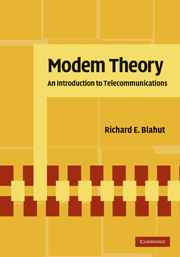
-
Select format
-
- Publisher:
- Cambridge University Press
- Publication date:
- 05 June 2012
- 26 November 2009
- ISBN:
- 9780511811401
- 9780521780148
- Dimensions:
- (247 x 174 mm)
- Weight & Pages:
- 1.16kg, 514 Pages
- Dimensions:
- Weight & Pages:
You may already have access via personal or institutional login
Book description
At the heart of any modern communication system is the modem, connecting the data source to the communication channel. This first course in the mathematical theory of modem design introduces the theory of digital modulation and coding that underpins the design of digital telecommunications systems. A detailed treatment of core subjects is provided, including baseband and passband modulation and demodulation, equalization, and sequence estimation. The modulation waveforms for communication channels and digital recording channels are treated in a common setting and with unified terminology. A variety of more advanced topics is also covered, such as trellis codes, turbo codes, the Viterbi algorithm, block codes, maximum likelihood and maximum posterior probability, iterative demodulation, and jamming. Numerous end-of-chapter exercises are also included to test the reader's understanding throughout. This insightful book is ideal for senior undergraduate students studying digital communications and is also a useful reference for practising engineers.
Contents
Metrics
Full text views
Full text views help Loading metrics...
Loading metrics...
* Views captured on Cambridge Core between #date#. This data will be updated every 24 hours.
Usage data cannot currently be displayed.
Accessibility standard: Unknown
Why this information is here
This section outlines the accessibility features of this content - including support for screen readers, full keyboard navigation and high-contrast display options. This may not be relevant for you.
Accessibility Information
Accessibility compliance for the PDF of this book is currently unknown and may be updated in the future.


